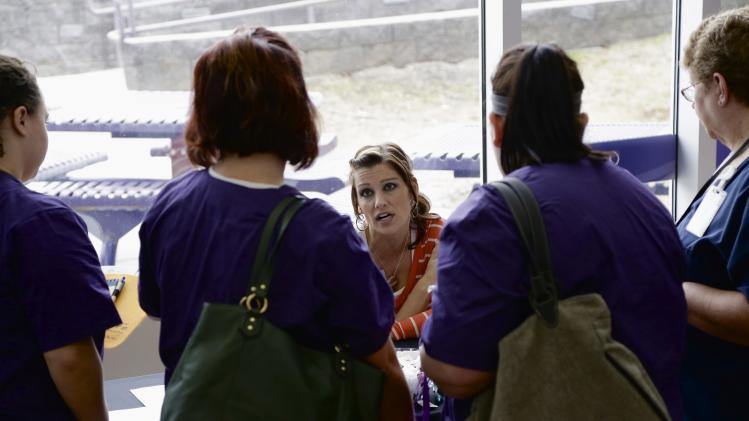In
this April 10, 2014 photo, Jennifer Stickney, a recruiter for Right at
Home, which provides in-home care and assistance, answers questions from
nursing students at a job fair on the campus of Kaplan University in
Lincoln, Neb. The Labor Department on Friday, May 2, 2014 said U.S.
employers added a robust 288,000 jobs in April, the most in two years,
the strongest evidence to date that the economy is picking up after a
brutal winter slowed growth. (AP Photo/Nati Harnik)
Any
period of unemployment can have a crippling effect on a worker’s career
and finances. But to be both young and unemployed in America presents
its own set of unique challenges.
Workers
under the age of 30 have contended with five solid years of
double-digit unemployment — 19% for 16- to 19-year-olds and 10.6% for
20- to 24-year-olds at last count. The economy is slowly improving and there are jobs to be had again. The overall U.S. unemployment rate
dropped to 6.3% in April as 288,000 jobs were added -- the highest in
two years, the Labor Department announced Friday. But young people who
haven’t been able to find work are now struggling to compete in a tough
job market with little experience.
“The
longer you’re not in the workforce, the harder it is to get back in,”
says Rory O’Sullivan, deputy director of the Young Invincibles.
“Employers look at resumes and there are a lot of young people working
outside of their field of study. You can imagine all those things can
make it harder to build a career.”
As many as one in five high school graduates and one in 10 college graduates are considered “disconnected youths,” those
who are not working or enrolled in college, according to a new report
by the Economic Policy Institute, a liberal think tank.
“There
is little evidence that young adults have been able to ‘shelter in
school’ from the labor market effects of the Great Recession,” the
authors write. “Increases in college and university enrollment rates
between 2007 and 2012 were no greater than before the recession
began—and since 2012, college enrollment rates have dropped
substantially.”
If
these “idle” young people were factored into unemployment rates, it
would raise the combined rate of unemployment for 16- to 25-year-olds
from 14.5% to 18.1%.
And of those young people who have managed to find work, nearly half are
considered to be underemployed, often working in part-time jobs that
may have little or nothing to do with their chosen career path. What’s
more, young people who graduate in 2014 will likely earn less than they
would have if they had graduated in a stronger economy, the EPI report
says.
Wages for high school graduates have dropped by 9.8% since the recession and wages for young college graduates fell by 6.9%.
Youth unemployment isn’t just a “young people” problem either. A recent report by
the Young Invincibles estimates it has cost the U.S. economy nearly $9
billion in lost tax revenue since 2007. Each unemployed 18- to
24-year-old represents an estimated $3,200 in lost tax revenue, and each
25- to 34-year-old costs more than twice as much: $7,000. And with nearly one-third of millennials living at home with their parents,
parents who might have otherwise been enjoying the relief of an empty
nest must instead continue their roles as financial guardians.
The
reality is that young people are disproportionately impacted by
economic downturns and no matter how much the U.S. economy improves,
they will be feeling the effects of the recession for many years to
come.
We
spoke with several young people under the age of 30 -- all solidly in
the “underemployed” camp -- who are struggling to launch their careers.
“My resume is a work of art.”
Sara Beck, 28, has spent the better part of a year trying and failing to find a full-time marketing position in Plymouth, Minn.
Her
troubles have little to do with her lack of education or job skills:
She has an MBA in international business, spent six years working
abroad, and speaks perfect Spanish.
“My
problem is that I’m either too experienced or not experienced enough
for some of the jobs I want,” she says. “I had a really promising
interview, but I got an email recently that they decided to go with
candidates whose experience aligned more with the requirements. It was
an entry-level position.”
While
Beck pursues a career in the U.S., her husband, a Chilean national,
stayed behind in Santiago to work on obtaining a work visa. She’s caring
for their daughter on her own while living with relatives until she can
find work.
“I
can't send my daughter to the daycare of my choice because I'm saving
money,” she says. “I have more than $70,000 left in student loan debt.
It's insane to think about.
In
the meantime, she has cobbled together enough freelance work to stay
afloat — writing, editing and translating gigs that put food on the
table but don’t necessarily improve her odds of landing a marketing job.
“I
try to take a job in, say, content writing and apply it to a job as a
business analyst,” she says. “My resume is a work of art."
Read More Here










No comments:
Post a Comment
Hello and thank you for visiting my blog. Please share your thoughts and leave a comment :)